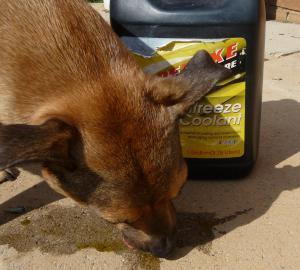What Should You Do if Your Pet Eats Something Toxic?
- posted: Sep. 15, 2018
 Help! My Pet Ate Something Toxic!
Help! My Pet Ate Something Toxic!
Swallowing a toxic substance is one of the most common reasons for a visit to the vet. But what can you do if your pet has eaten something he shouldn’t have? Here, we will discuss some common dos and don’ts. Eating a foreign object such as a sock can also be hazardous, but that is another topic!
First, what are some potential toxic substances that may be harmful to your pet? Common toxins include: antifreeze, rat or mouse poison, chocolate, plants and medications. Pet proof your home by making sure your pet does not have access to detergents, cleaning solutions, drugs or antifreeze and know which foods (like chocolate and grapes) or plants (lilies) are a no-go for your pet.
What do you do if you’ve seen your pet ingest something potentially harmful? First, don’t panic! Accidental exposure to poisons is fairly common in the veterinary world. If you have witnessed your pet eating something poisonous, chances are we can help her. Next, consider calling a Pet Poison Control hotline. While there is a fee for accessing these call centers (usually around $50-$70), they can provide vital information about toxic or lethal doses, symptoms and treatment. This information is especially useful if your pet has had exposure to a human drug as many vets do not have easy access to treating accidental exposure or overdose of these medications.
Two commonly used helplines are the Pet Poison Helpline (855) 764-7661 and the ASPCA Poison Control Line (888) 426-4435.
Next, if the toxin your pet has ingested is not caustic (i.e. likely to cause chemical burns such as bleach) and if he or she swallowed it within the past hour, you may be instructed to induce vomiting. Hydrogen peroxide can be used as a home remedy to induce vomiting in dogs, but should NEVER be used in cats except in the most dire of emergencies. Peroxide causes damage to the lining of cat’s stomachs and can cause it to bleed and actually slough or detach. To repeat—DO NOT GIVE PEROXIDE TO CATS! Vets have access to drugs to induce vomiting in both cats and dogs, so, when in doubt, take your pet immediately to the vet. Early decontamination provides the best outcome with drug or toxin exposure.
If your pet is non-responsive, rapidly deteriorating, already vomiting, having trouble breathing, etc. DON’T DELAY! Take your pet to his vet or to a veterinary emergency clinic immediately!
Pets may also need supportive care such as IV fluids, additional decontamination steps such as administering activated charcoal to prevent further absorption of toxins and, if available, your pet may be given a specific antidote. Your pet may also have blood tests done and may need to return for lab work days or weeks later as some toxins can cause delayed damage to organs like the liver or kidneys.
When in doubt don’t wait, take your pet to the vet. If you don’t know what the toxin was, or when it was eaten, there may still be treatment available. If you do know what the pet ate, bring the drug, plant, etc. and/or any packaging with you. Again, the earlier a toxin is recognized and treated, and the more information we have, the better the chance of recovery.
This blog brought to you by the Patton Veterinary Hospital serving Red Lion, York and the surrounding communities.
Location
Patton Veterinary Hospital
425 E Broadway
Red Lion, PA 17356
